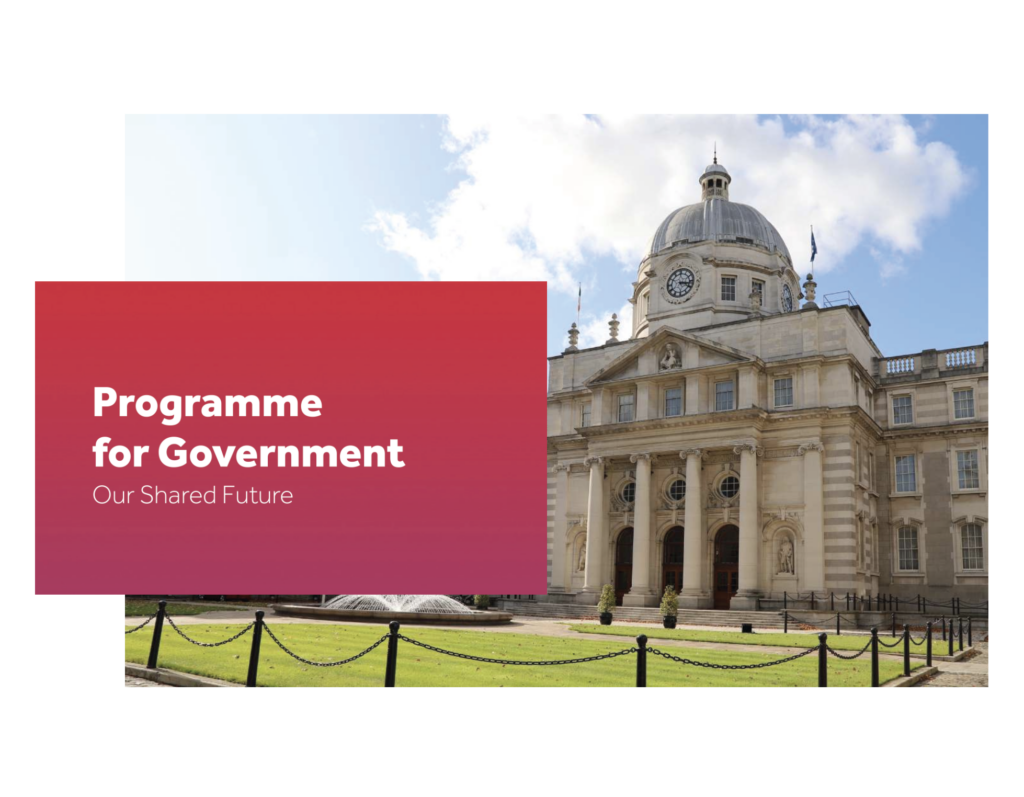
Ireland’s latest Programme for Government, which has just been ratified, presents a roadmap for tackling pressing issues like waste management and promoting a circular economy. However, upon further inspection we noticed one striking omission from the document: The complete absence of figures or quantifiable targets. The commitments largely focus on maintaining existing goals, with very few new initiatives introduced. Despite the climate and biodiversity crisis being declared an emergency six years ago, this urgency is not reflected in the document, which raises concerns about whether the Government’s approach matches the scale of the challenge.
The Programme is peppered with vague terms such as “explore,” “review,” “assess,” and “examine,” which often leave commitments open-ended and difficult to measure. While these words indicate intent, they lack the specificity needed to ensure accountability and progress.
Promoting a Circular Economy
The Government’s commitment to ending the linear “take-make-consume-throw-away” model is evident (why are we still talking about this in 2025?), with a focus on extending product life cycles and reducing waste. Some highlights include:
- Solid Commitments:
- Revising public procurement guidelines within 12 months to incorporate waste minimisation and circular economy principles. This is a concrete and measurable action that promises tangible progress in aligning government practices with sustainability goals.
- Supporting enterprises like repair and refurbishment centres, which can create local jobs and foster a culture of reuse and repair.
- Publishing a plan to expand producer responsibility schemes. Taking accountability for the entire lifecycle of products signals a forward-thinking approach.
- Vague Aspirations:
- The promise to “work with EU Member States to encourage the reduction of plastic packaging” lacks a clear plan of action. How will this be achieved? What are the timelines and measurable outcomes?
- “Assessing the need for a new waste-to-energy facility” and “exploring zero waste infrastructure” are notable but leave much to interpretation. These steps could lead to significant progress or stagnation, depending on the follow-through.
Tackling Littering and Illegal Dumping
The Government outlines strong measures to combat littering and illegal dumping, which mar public spaces and harm the environment.
- Positive Actions:
- Increasing penalties for littering and illegal dumping sends a strong message that environmental harm will not be tolerated.
- Utilising tools like CCTV and drones to monitor hotspots demonstrates a willingness to leverage technology for enforcement.
- Room for Improvement:
- While targeting dumping black spots is laudable, the document lacks detail on how these efforts will be coordinated across local authorities and the expected outcomes.
- The emphasis on regular clean-ups is necessary but would benefit from integration with broader educational campaigns to instill long-term behavioural change.
Additional Commitments
Beyond waste management, the Programme touches on related areas that intersect with sustainability:
- Hot School Meals: Ensuring that suppliers adhere to guidelines on nutritional value, reduce food waste, and use recyclable packaging is a multi-pronged approach to addressing sustainability in schools. There is currently a lot of single use waste with this rollout, so some more concrete goals around this would have been good to see.
- Urban Greening: Prioritising the greening of urban environments aligns with goals for cleaner cities and improved air quality, enhancing quality of life for residents.
The Need for Clearer Language and Targets
While the Programme contains promising initiatives, the prevalence of vague language undermines its potential impact. Words like “explore” and “assess” often leave commitments open-ended, risking a lack of accountability. For instance, requiring each local authority to create a circular economy strategy is a step forward, but without clear timelines or enforcement mechanisms, this could become another box-ticking exercise.
A Path Forward
To truly drive change, the Government should:
- Set specific, measurable, and time-bound targets for each initiative, ensuring accountability.
- Provide detailed plans for actions described with vague terms, clarifying how and when these will be executed.
- Enhance public transparency, publishing progress reports on commitments like revising procurement guidelines or expanding producer responsibility schemes.
- Integrate educational campaigns to complement enforcement measures, fostering a culture of sustainability.
Conclusion
Ireland’s Programme for Government signals an intent to lead on circular economy and waste management, though there hasn’t been much of anything new mentioned when it comes to concrete goals. The overall attitude seems to be one of “maintaining” what we have been doing up until now (which hasn’t been good enough), as opposed to real systemic change and roadmaps to achieving these changes. While there are some solid commitments, the reliance on vague language in parts of the document dilutes its impact. By building on the strengths of the Programme and addressing areas of ambiguity, the Government can take meaningful strides toward a sustainable future. For citizens and stakeholders, holding leaders accountable for these promises will be key to ensuring that Ireland’s environmental ambitions become reality.
Comment below with your thoughts on the full programme, which can be accessed here. We would love to hear from you!
